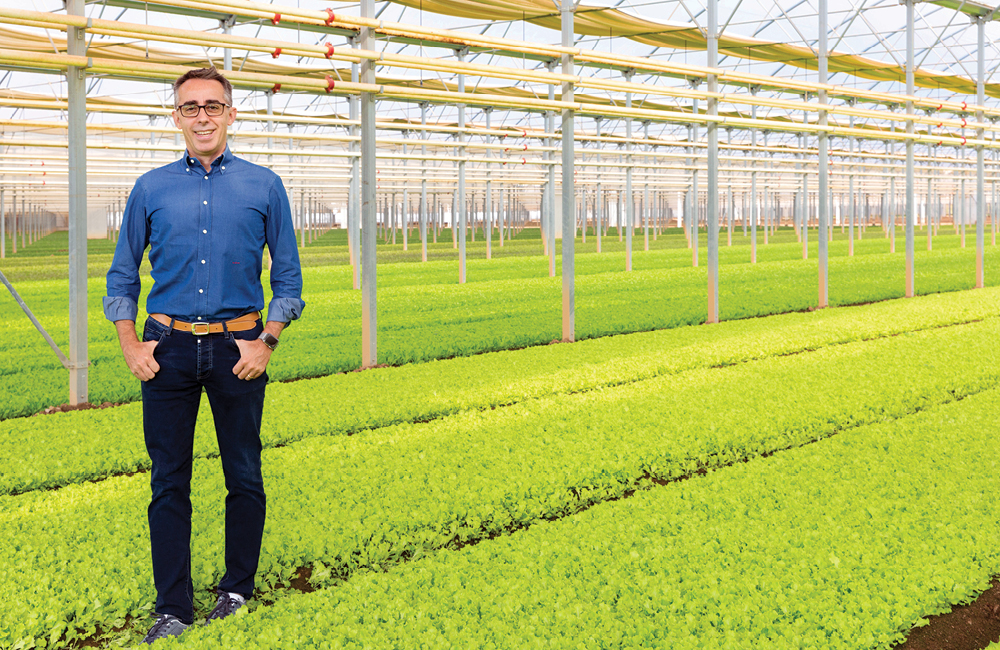Although every CEO and business leader aspires to deliver it, driving sustainable, inclusive growth requires the right mindset, strategy and capabilities—yet growth often remains elusive. Between 2010 and 2019, only one in eight companies achieved more than 10% revenue growth annually. One executive to crack the code is Bonduelle Fresh Americas CEO Andrea Montagna, who assumed the chief executive position in August 2021. Prior to that, Montagna oversaw the Bonduelle division in Italy, where he was credited with “increasing profits in his two years at the helm,” according to the company.

BIO: Andrea Montagna, CEO, Bonduelle Fresh Americas / Andrea Montagna joined Bonduelle Fresh Americas in August 2021, bringing more than 20 years of experience in growth-focused businesses. Prior to joining Bonduelle Fresh Italy as a commercial director in January 2017, Mr. Montagna was GM for Bolton Group in Milan, and previously worked for 11 years with Henkel, based in Italy, Germany and the U.S Mr. Montagna holds a bachelor’s degree in business from Università Commerciale Luigi Bocconi and a master’s degree in international business from the University of Cologne. A theater and movie buff, he is fluent in Italian, English and German.
When Bonduelle ended its fiscal year in 2021, the company reported $3.2 billion in revenue, of which it attributed $1.7 billion to its non-European operations. With more than 3,200 employees, Bonduelle Fresh Americas runs four processing facilities in the U.S. that focus on prepared meal solutions, fresh vegetables and salads for the Americas market under the Ready Pac Foods brands.
Recently, IQ sat down with Mr. Montagna to gain perspective and insight on how to catalyze consistent growth—particularly in an increasingly unstable global business environment.
IQ: Prior to assuming the chief executive role, you made a tremendous impact leading the Bonduelle Italy division and increased profits for two consecutive years. What unique growth challenges are present in the food processing sector, and how were you able to overcome those challenges and catalyze your teams to achieve consistent growth year after year?
Mr. Montagna: The challenge we faced in Italy, which is similar to the one here in the U.S., is that food is a commodity. Overcoming that hurdle has essentially been the secret of our success. Bonduelle Fresh Americas has been able to move away from commoditization due to the focus and investment we have made to change the positioning of our brand.
IQ: How so?
Mr. Montagna: We began by advertising our brand differently, and we targeted a different consumer. Previously, the majority of our customers were interested in their own private white-label business. This is true of both the Italian and U.S. markets, where we provide both branded and private-label options. However, in order to move away from commoditization, we had to invest in our brand, and focus less on price, which is the primary economic driver within the white-label business.
IQ: What strategic investments did you make when deciding to position the brand in the U.S. front and center in the fresh-packaged food space?
Mr. Montagna: Quality. Our immediate focus was to go above and beyond on quality. This meant investments in additional checks and protocols to ensure that quality remained at the forefront of our business. While consumers have appreciated the quality of our products for years, we know trust can be easily lost. In food service, for example, consumers are trusting you with their well-being and that of their families. Therefore, quality for them becomes imperative. As a starting point, we want consumers to always connect our products and our brands with the highest standards of quality.

Mr. Montagna and his team were present at Insigniam’s Executive Summit earlier this year.
IQ: What is your approach to maintaining a focus on quality—which amounts to a substantial investment within the company—as operational expenses rise in a traditional low-margin market such as the fresh foods sector?
Mr. Montagna: We operate in a very low-margin market, which means you cannot grow if you do not improve your manufacturing and operational excellence. A substantial component of our strategy is a laser focus on industrial competitiveness.
To achieve this, we focused on automation in order to right-size our food production and preparation plants to reflect market demand. Our industrial capabilities were refocused to respond and adapt to new market trends. And, in doing so, we invested in automation to drive down cost. So it is possible to be cost-minded without losing sight of quality, which must at all times be paramount for our brand, especially in such a competitive market.
IQ: Speaking of refinements to your manufacturing process and enhancements to your brand, what is your approach to enroll multidisciplinary teams around huge initiatives within the company?
Mr. Montagna: Corporate culture is our biggest competitive advantage, in my opinion. You must first break down silos where they exist—which I found were somewhat prevalent within our U.S. operations when I assumed the chief executive role. My focus has been to spur greater collaboration by connecting cross-functional teams, leaders and executives.
IQ: Were you able to pull from your experience leading Bonduelle Italy?
Mr. Montagna: Absolutely. In Italy, I insisted that people from all different functions come visit our food processing plants. The intent was to show them firsthand what we mean when we speak about quality—which is what our customers and consumers demand from us. I also made sure our logistics and supply chain teams understood our marketing, sales and branding verticals. This was explicitly done to eliminate silos, but it also greatly aids in getting people aligned and bought-in to working collaboratively and cross-functionally, which is imperative to our overall strategy. Far too often I’d hear instances of supply chain and sales teams, for instance, blaming one another for a perceived breakdown in process or execution without actually working together to solve for the question at hand.
To overcome this, strong communication is critical. Once sales can understand the challenges facing logistics teams—and how that impacts supply chain and quality assurance—people begin to see the world expand before their eyes, and they begin to work more collaboratively to solve for issues impacting the entire business. But most importantly, everyone must have the end consumer—and a commitment to providing that consumer with a product of unrivaled quality—in mind.

Mr. Montagna frequently brings corporate teams to meet with farmers and growers directly, to better understand specific needs and concerns throughout the supply chain.
IQ: Does this spirit of collaboration and cohesion within Bonduelle Fresh Americas extend to your external business partners as well?
Mr. Montagna: Very much so. It’s critical not to become overly myopic even when you’re breaking down walls. For example, I took our marketers to meet directly with growers, which was eye-opening for both groups. The marketers were able to communicate consumer trends, while growers were able to look at how they grow and produce yield in a different way. Most importantly, though, both of these very disparate groups were united by a common element: They’re both passionate about serving consumers who buy and enjoy our products.
IQ: I’m sure the cultural divide between the U.S. and Italian teams you’ve led is broad. After finding such impressive success in Europe, how did you prime yourself for success after being tapped to run Bonduelle Fresh Americas?
Mr. Montagna: For me, the easiest thing to do was to begin by asking questions. My personal belief is that if the CEO is asking questions that prompt others to be inquisitive, walls and silos begin to erode. When people start to investigate new solutions and think differently, they unknowingly move beyond their convictions about what is true or possible.
In some respects, it also helped that I’m a foreigner and was allowed to ask all types of questions. But beyond that, when a leader or executive assumes they already know how to solve a problem or address an issue because they achieved some measure of success in a different part of the business, they are often met with less than favorable results.
IQ: Along with operational excellence, what role does product innovation play in driving long-term, sustainable growth?
Mr. Montagna: Well, since the invention of fresh-cut salad—and the bowl—you could say not that much innovation has happened [laughs]. That said, the crux of our focus on innovation has been to leverage our capacity to bring fresh food to market in a more efficient way, as well as creating meal solutions for breakfast, lunch and dinner. It’s also critical to understand where not to invest. For example, many companies are investing in snack foods, which does not represent a growth opportunity for our business since it’s already quite a crowded space.
IQ: Amid this, how has Bonduelle been affected by the ongoing impacts of the labor shortage, especially here in the U.S.?
Mr. Montagna: Yes, we have been severely impacted, as have many different enterprises. A colleague asked me if anything keeps me up at night, and my answer is always the same: hiring.
When I first assumed the CEO role, we didn’t have enough workers in our plants. We were also lacking people within our corporate offices. It was extremely difficult to hire, and turnover rates were extremely high. So we started asking questions of our employees: for instance, what was important to them—why were they leaving?
When it came to our front-line workers, for instance, many were leaving because of scheduling challenges; they were unable to take off work for two consecutive days, which prevented them from having quality time with their families. So we completely restructured our manufacturing schedule in order to meet the food safety standard on time and to alternate shifts so that employees are afforded consecutive days off. We also increased our wages and organized regular town-hall meetings to get direct feedback from our teams, which allows us to be agile and respond to the needs of our workforce without compromising the quality of our product.
IQ: As we know, today’s consumers care just as much about environmental, societal and corporate citizenship issues as they do brand loyalty and product quality. Can you describe the Bonduelle Fresh Americas strategy for positively impacting people, food production and even the planet?
Mr. Montagna: This is a key pillar of our strategy because, as you mentioned, this is a strong requirement for a consumer. Bonduelle is a seventh-generation family-owned business, and sustainability has been one of our core tenets long before it was in fashion.
All our products are farmed from vegetable plants, and we do see the effect of climate change. In some cases, we’ve seen reductions in crop yields, and environmental impacts are driving us further and further toward sustainability. To address this, Bonduelle Fresh Americas is pursuing B Corp certification, which signifies the highest verified standards of social and environmental performance and public transparency to balance profit and purpose.
We are anticipating reaching B Corp certification by the end of our fiscal year. In the meantime, our actions continue to focus on making a positive impact on people, planet and food with programs driving inclusive hiring, environmentally friendly manufacturing processes, water and waste management, plastic reduction, and so on.
IQ: What advice would you have for other executives who share your perspective, but perhaps are unsure how to put it into action?
Mr. Montagna: I think that we—as individuals—may sometimes underestimate the role that we have and the ability we
have in changing the direction of a company. I joined Bonduelle Fresh Americas because we need to elevate the brand and restructure the company in order to respond to pressing challenges, both internal and external. I also believe that people today must identify with the vision of a company for the work to make a resounding impact. My advice would be to ask questions and make an investment in growing collaboration across an organization.
If you tell people that things are going to change, you must enroll the hearts and minds of those we lead. The only way to do that is to be transparent, and that’s when we begin to work and think differently. All of these steps lead to more engaged teams, which typically deliver better financial results.
This article appeared in the Fall 2022 issue of Insigniam Quarterly with the headline “Fresh Thinking.”






